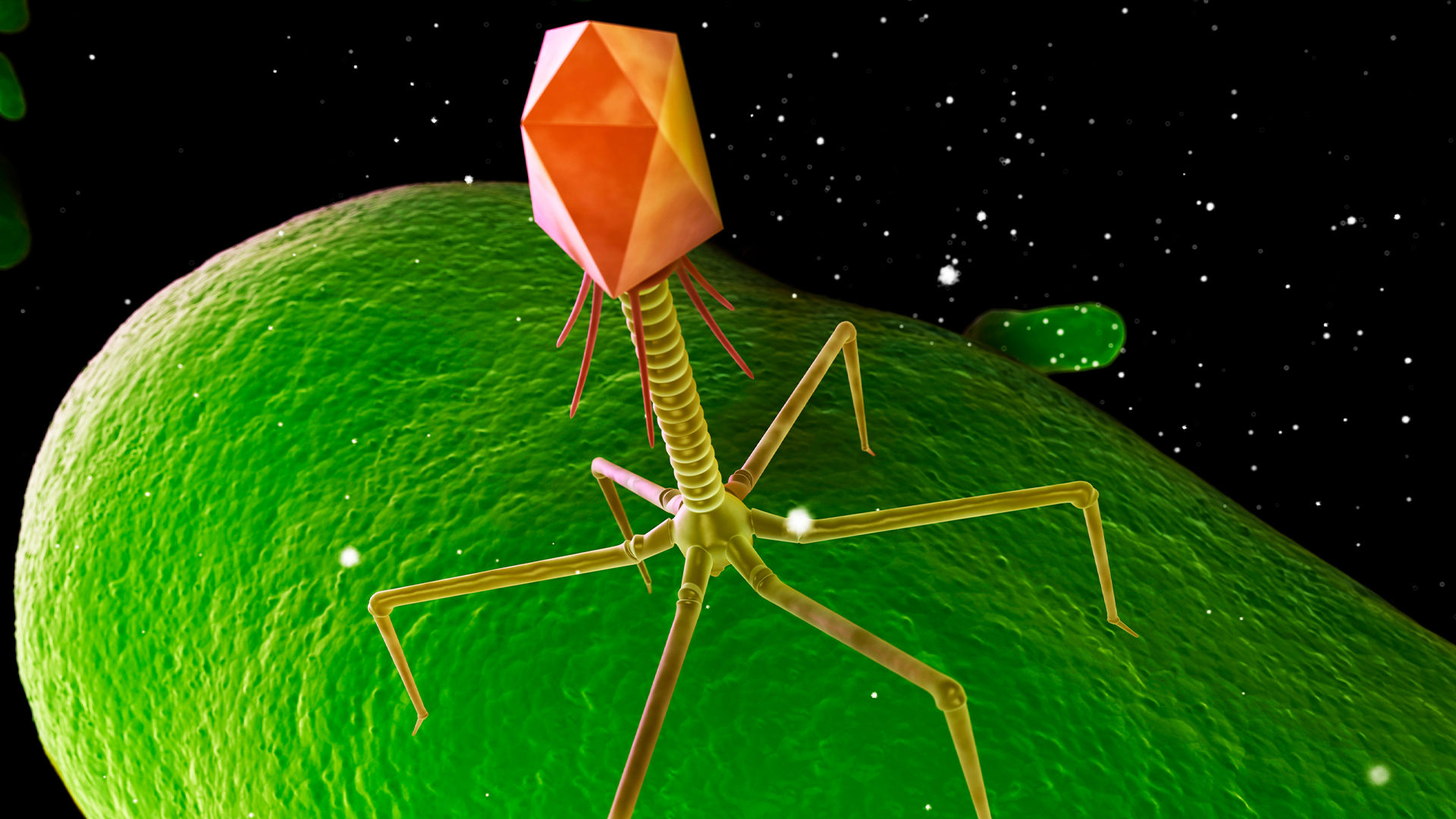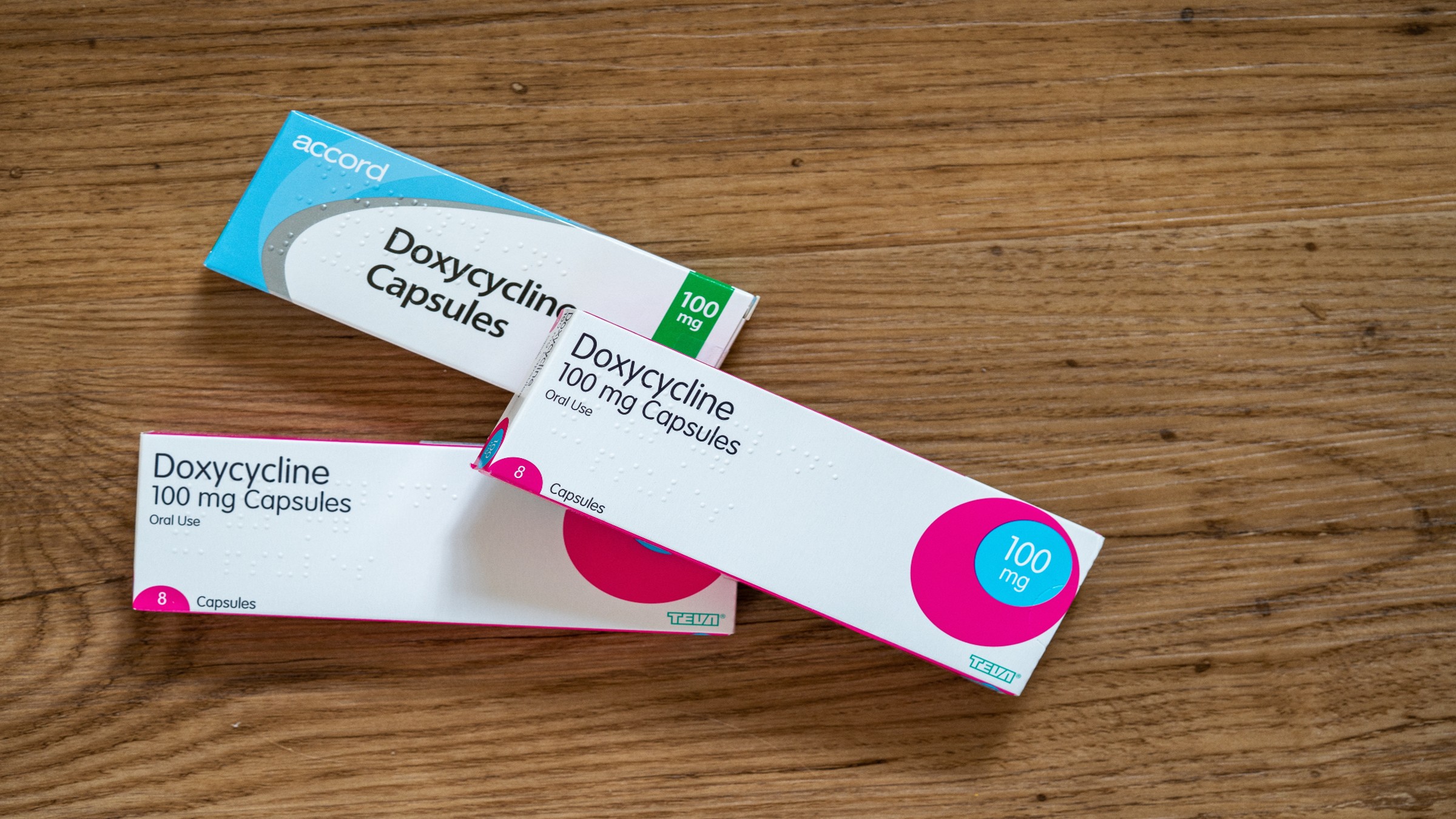Could bacteria-killing viruses ever prevent sexually transmitted infections?
The CDC will soon recommend that some people take a "morning-after" antibiotic to lower their risk of STIs. But someday, it's possible that bacteria-killing viruses could do this without driving antibiotic resistance.

Get the world’s most fascinating discoveries delivered straight to your inbox.
You are now subscribed
Your newsletter sign-up was successful
Want to add more newsletters?

Delivered Daily
Daily Newsletter
Sign up for the latest discoveries, groundbreaking research and fascinating breakthroughs that impact you and the wider world direct to your inbox.

Once a week
Life's Little Mysteries
Feed your curiosity with an exclusive mystery every week, solved with science and delivered direct to your inbox before it's seen anywhere else.

Once a week
How It Works
Sign up to our free science & technology newsletter for your weekly fix of fascinating articles, quick quizzes, amazing images, and more

Delivered daily
Space.com Newsletter
Breaking space news, the latest updates on rocket launches, skywatching events and more!

Once a month
Watch This Space
Sign up to our monthly entertainment newsletter to keep up with all our coverage of the latest sci-fi and space movies, tv shows, games and books.

Once a week
Night Sky This Week
Discover this week's must-see night sky events, moon phases, and stunning astrophotos. Sign up for our skywatching newsletter and explore the universe with us!
Join the club
Get full access to premium articles, exclusive features and a growing list of member rewards.
Rates of bacterial sexually transmitted infections (STIs) are soaring in the U.S. These mounting chlamydia, gonorrhea and syphilis cases are treated with antibiotics, but at a price: Antibiotics push bacteria to gain resistance to the drugs.
Therefore, it will be key to find new ways to stave off STIs while also reducing our dependence on antibiotics. For now, however, we're caught in a bind.
A prime example of this problem is doxycycline post-exposure prophylaxis, or "doxy-PEP," an antibiotic regimen intended to prevent STIs. The Centers for Disease Control and Prevention (CDC) will soon recommend that doctors prescribe the antibiotic doxycycline (doxy) to at-risk individuals, so they can take it after unprotected sex. The hope is that this preemptive treatment can help reduce America's skyrocketing STI rates.
Evidence suggests doxy-PEP can cut people's risk of chlamydia, syphilis and gonorrhea, although it's least effective against gonorrhea, which is often resistant to doxycycline. Still, some experts worry doxy-PEP could boost antibiotic resistance over time.
Could there be a better option for preventing STIs? Experts say we could someday use bacteria-killing viruses called bacteriophages, or phages. For now, using phages to prevent STIs remains hypothetical, but they might one day help to scale back the amount of antibiotics needed to both prevent and treat STIs and thus reduce the burden of antibiotic resistance.
"Phages alone most probably will not be able to cover all the demands" placed on antibiotics, Mikael Skurnik, a phage researcher at the University of Helsinki in Finland, told Live Science. He added that, in general, combination therapies of phages alongside antibiotics have proved synergistic in treating bacterial infections, so these combo-therapies could someday be useful in STI prevention, too.
Related: Dangerous 'superbugs' are a growing threat, and antibiotics can't stop their rise. What can?
Get the world’s most fascinating discoveries delivered straight to your inbox.
The advantages of 'phage-PEP'
The CDC's drafted recommendations about prescribing doxy-PEP will be open to public comment until Nov. 16. Assuming these are made official, some experts worry about the consequences for antibiotic resistance.
"When I hear 'prophylactic' and 'antibiotic,' it's scary," said Sabrina Green, a phage researcher at KU Leuven in Belgium. She told Live Science that doxy-PEP could be concerning if used repeatedly. Lending merit to this concern, two doxy-PEP trials found that participants took the medication three or four times per month, on average.
With the threat of antibiotic resistance looming, some researchers are turning to phages. These are viruses that infect bacteria, replicate inside them and cause them to burst. "Each infected bacterium will release, after the life cycle of the phage, around 100 to 200 new phage particles," Skurnik said. This replenishes the phage army until the bacterial population drops enough for the immune system to clear the infection, he said.
Clinical applications for phage therapy are currently very limited. In the U.S., there have been few clinical trials involving phages, and the viruses are typically used only when no other treatment works. But in some European countries, phage therapy can be used for less-severe infections.
If trials can confirm the safety and value of phage therapy seen so far with its limited use, it may someday make a strong alternative to antibiotics. And there are several reasons why phages might make better prophylactics than antibiotics such as doxy-PEP.
One advantage is that phages can kill nonresistant and resistant bacteria, whereas trials found that doxy-PEP was ineffective against resistant strains of gonorrhea. In addition, because of the dual action of phages and antibiotics in combination therapies, lower doses of antibiotics would be needed to treat infections, Skurnik noted.
Ever wonder why some people build muscle more easily than others, or why freckles come out in the sun? Send us your questions about how the human body works to community@livescience.com with the subject line "Health Desk Q," and you may see your question answered on the website!
Another strength is that phages won't put pressure on bacteria to evolve resistance to doxycycline or to other antibiotics, as both Green and Skurnik worry could be the case with doxy-PEP.
Related: Superbugs are on the rise. How can we prevent antibiotics from becoming obsolete?
Bacteria have mechanisms to trade genes with each other, allowing microbes to share their resistance to broad-spectrum antibiotics. What's more, bacteria tend to swap clusters of antibiotic-resistance genes, so the misuse of one antibiotic can drive resistance to multiple drugs. Phage resistance, however, tends to involve genes that are specific to a bacterial species and aren't normally traded, making it improbable for bacteria to evolve or spread resistance against multiple phages.
That said, bacteria can evolve resistance to individual phages, so a mixture of different phages would likely be needed to prevent the bacteria's escape.
Compared with antibiotics, phages are also less likely to disturb the microbiome — the microbial community living inside us — because they typically kill one bacterial species or strain. Doxycycline, on the other hand, is a broad-spectrum antibiotic that clears out many helpful bacteria and can allow opportunistic microbes to proliferate unchecked.
"Sometimes yeasts may take over," Skurnik noted. For example, Candida, a fungus that's normally harmless can cause an infection called thrush following doxycycline treatment. It's difficult to draw definitive conclusions about the safety of phages given their limited use, but by weaning us off antibiotics, the viruses could theoretically help avoid health concerns that come with disrupting the microbiome.
Barriers to using phage-PEP
Several hurdles hold back phage therapy from being used for STIs.
For example, chlamydia replicates only within the body's cells. Delivering phages into human cells, rather than into free-floating bacteria, is a technical obstacle, but some groups have experimented with encasing phages in fat bubbles called liposomes that readily enter cells.
But the larger problem is that, although researchers have found some phages that work against bacterial STIs, they have not found enough to make a phage mixture. Nevertheless, less than 0.0002% of phages worldwide have been sampled, suggesting many clinically valuable ones remain undiscovered. Phage research tends to be biased toward well-studied, model bacteria that are easy to grow, rather than the bacteria that cause STIs, Skurnik noted, and the few phages known to target bacterial STIs have not been studied extensively yet.
Related: Viruses lurking in giraffe and lemur poop could lead to new antibacterial drugs, scientists say
If scientists can't find phages that infect STI-causing bacteria, phage engineering may offer a solution. For example, several gonorrhea-targeting phages exist as so-called prophages, meaning they silently incorporate their genes into bacteria for a time before replicating and splitting their hosts open. There's potential to engineer prophages so they kill their hosts right away, Green said.
"Using artificial intelligence and engineering, you may generate in the lab a diversity of phages which may then cover most of these bacterial pathogens," Skurnik said.
But again, phage therapies to prevent STIs are still a long way off, and doxy-PEP sparks worry at the moment.
"It concerns me as a microbiologist," Green said, adding that people taking doxy-PEP should be closely monitored to track resistance. "We haven't quite perfected phage therapy for these types of infections, and if they become drug resistant then really they have no options," she cautioned.
This article is for informational purposes only and is not meant to offer medical advice.

Kamal Nahas is a freelance contributor based in Oxford, U.K. His work has appeared in New Scientist, Science and The Scientist, among other outlets, and he mainly covers research on evolution, health and technology. He holds a PhD in pathology from the University of Cambridge and a master's degree in immunology from the University of Oxford. He currently works as a microscopist at the Diamond Light Source, the U.K.'s synchrotron. When he's not writing, you can find him hunting for fossils on the Jurassic Coast.
 Live Science Plus
Live Science Plus











